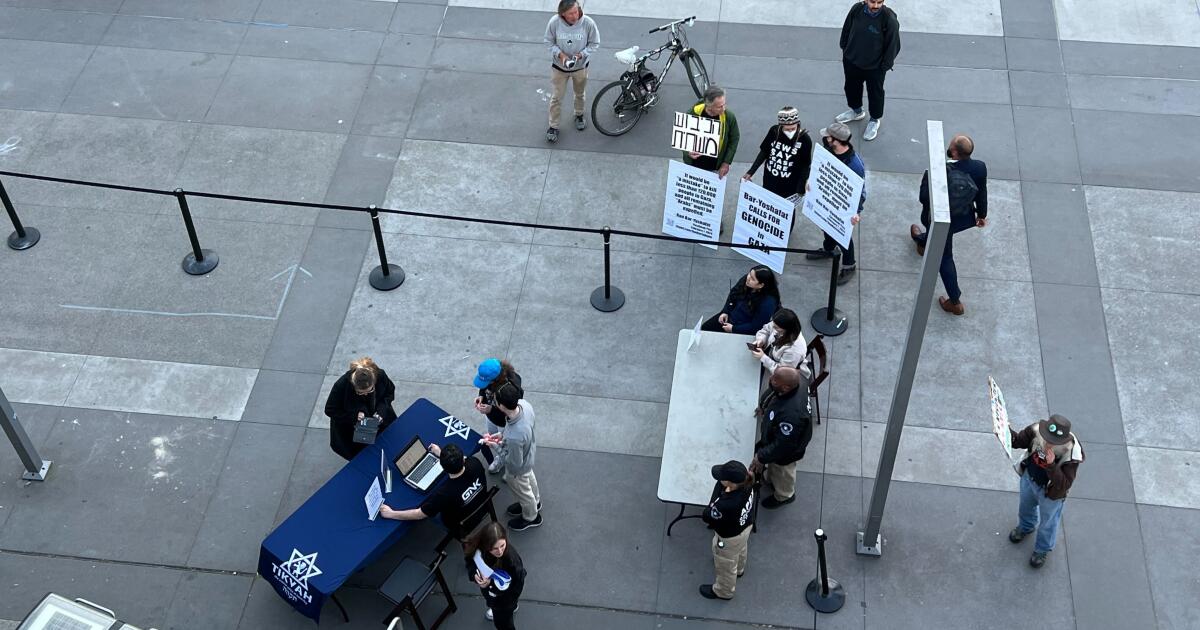World News
Hezbollah fires heavy rockets at northern Israel after deadliest day of Israeli strikes on Lebanon

BEIRUT (AP) — The Lebanese militant group Hezbollah fired rockets with heavy warheads at towns in northern Israel, saying it used the weapons against civilian targets for the first time Thursday in retaliation for Israeli airstrikes the night before that killed nine, including what the group said were several paramedics.
There were no reports of Israelis hurt in the rocket attack, local media said. The Israeli military did not immediately offer comment on the rocket attack.
Since the outbreak of the Israel-Hamas war in Gaza on Oct. 7, concerns have grown that near-daily clashes along the border between Israel and Lebanon could escalate into a full-scale war. Airstrikes and rocket fire Wednesday killed 16 Lebanese and one Israeli, making it the deadliest day of the current conflict.
Israel’s chief military spokesman, Rear Adm. Daniel Hagari, said Israel had killed 30 Hezbollah militants in the past week and had destroyed dozens of Hezbollah military sites in an effort to push the Iran-backed group away from the border.
The recent increase in violence has raised alarm in Washington and at the United Nations.
“Restoring calm along that border remains a top priority for President Biden and for the administration,” White House national security spokesman John Kirby told reporters, saying the U.S. is closely monitoring developments. “We’ve also been very, very clear: We do not support a war in Lebanon.”
Kirby said the U.S. is working to halt the fighting through diplomatic efforts. This needs to be a top priority for Israel and Lebanon, he said, and would allow displaced civilians to return home. Tens of thousands of people on both sides have fled the fighting.
At around sunset Thursday, a barrage of Katyusha and Burkan rockets was fired toward the Israeli village of Goren and Shlomi, a statement from Hezbollah said. Hezbollah’s Al-Manar TV said the group had not previously fired Burkan rockets at civilian targets, but was now responding to the recent spate of Israeli airstrikes.
Lebanon’s state media reported that 10 paramedics were among those killed Wednesday. The Israeli military said it struck targets for Hezbollah and an allied Sunni Muslim group.
Hezbollah has frequently used Russian-made portable anti-tank Kornet missiles in recent months. More rarely, it has launched Burkan rockets which, according to the group’s leader Hassan Nasrallah, can carry a warhead that weighs between 300 kilograms (660 pounds) and 500 kilograms (1,100 pounds).
Hezbollah says its attacks aim to keep some Israeli divisions busy and away from Gaza, and Nasrallah says attacks on the border will only stop when Israel halts its offensive in Gaza.
Gen. CQ Brown, chairman of the U.S. Joint Chiefs of Staff, told reporters Thursday he has discussed with Israeli counterparts that Israel doesn’t need “to have a northern front that they have to deal with as they’re dealing with Gaza.” And he said he spoke with Lebanon’s chief of defense also, in an effort to do what the U.S. can to “help bring down the temperature.”
The U.N. peacekeeping force in south Lebanon known as UNIFIL said Thursday it was imperative that “this escalation cease immediately.”
“We urge all sides to put down their weapons and begin the process toward a sustainable political and diplomatic solution,” UNIFIL said. It added that the peacekeeping force remains ready to support that process in any way it can.
The fighting has killed nine civilians and 11 soldiers in Israel. More than 240 Hezbollah fighters and about 50 civilians have died in Lebanon.
___
Associated Press writer Seung Min Kim in Washington and Melanie Lidman in Tel Aviv, Israel, contributed to this report.
World News
Cornell University President, Martha Pollack, Resigns

Martha E. Pollack, Cornell University’s president for the past seven years, announced in a surprise email on Thursday afternoon that she is resigning.
“I understand that there will be lots of speculation about my decision, so let me be as clear as I can: This decision is mine and mine alone,” she wrote in her email, addressed to “Cornellians.” “After seven fruitful and gratifying years as Cornell’s president — and after a career in research and academia spanning five decades — I’m ready for a new chapter in my life.”
Dr. Pollack, a computer scientist, said she would remain in office until July 1.
In a separate announcement, Kraig H. Kayser, the chairman of Cornell’s board of trustees, said the board had asked the university provost, Michael I. Kotlikoff, to serve as interim president for two years. Dr. Kotlikoff was previously dean of Cornell’s College of Veterinary Medicine, among other posts.
Dr. Pollack’s resignation means that four of the eight Ivy League universities — Harvard, Yale, the University of Pennsylvania and Cornell — will now be in various stages of leadership transition, three of them with interim presidents already in charge or presidential searches underway. The presidents of Harvard and Penn resigned in the last six months, in part because of fallout over their testimony at a December congressional hearing investigating campus antisemitism.
Mr. Kayser said that Cornell’s trustees would wait to begin a search for a new permanent president until about six to nine months before the end of Dr. Kotlikoff’s two-year term, an unusually long delay.
Dr. Pollack, 65, leaves at a time of controversy over disciplinary action Cornell has taken against pro-Palestinian student protesters. While Cornell has not summoned outside police forces to its campus in Ithaca, N.Y., it has taken what some professors called draconian measures against six protesters. Critics have found the disciplinary actions particularly disturbing coming in a school year when Dr. Pollack launched a campus free-expression initiative.
Though the students’ protest remained peaceful, the university invoked a provision calling for “immediate temporary suspension,” a measure intended for situations where the safety and health of the community were threatened, according to Risa L. Lieberwitz, a Cornell professor and the campus president of the American Association of University Professors.
“It is not intended to be used where the university is unhappy about the fact that you have an encampment and chanting,” she said.
Professor Lieberwitz called on Dr. Pollack to revoke the students’ suspensions — penalties that could erase their academic credits for the semester — as a parting presidential act that would ease tensions on campus.
Mr. Kayser called Dr. Pollack a “transformational leader” who increased financial aid and created new academic programs at Cornell.
World News
Elphicke apologises for comments on assault victims

Some Labour MPs have raised concerns about the comments after the Dover MP defected to the party.
Source link
World News
‘Are you a Zionist?’ UCLA checkpoints provoked fear, debate for Jews
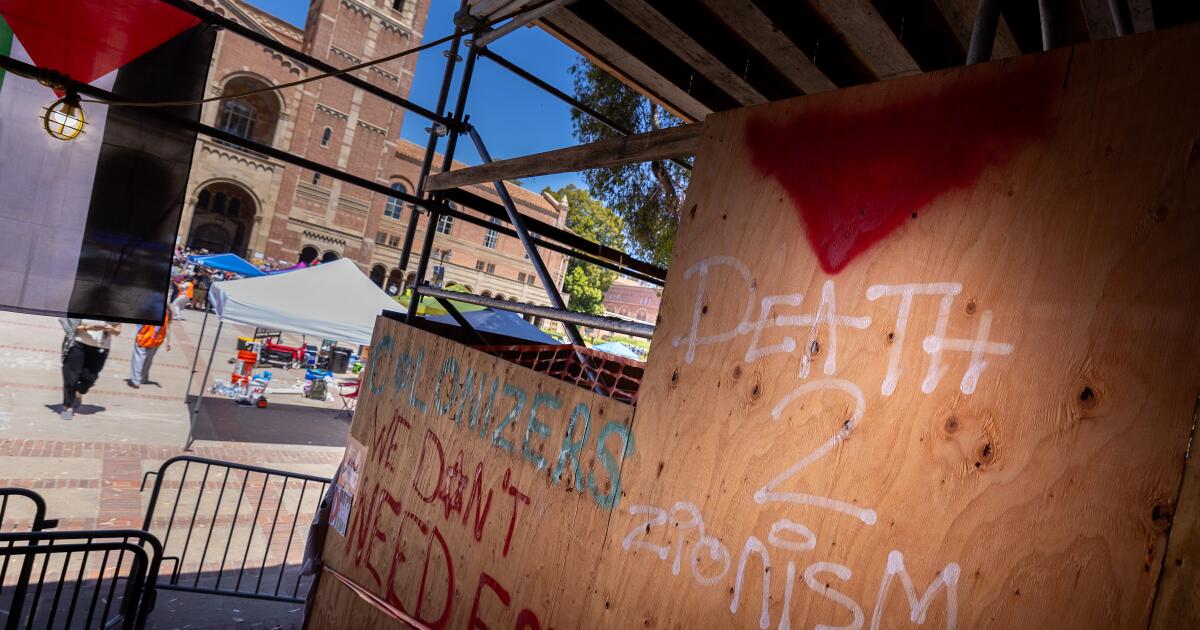
Eilon Presman was about 100 feet from the UCLA Palestinian solidarity encampment when he heard the screams: “Zionist! Zionist!”
The 20-year-old junior, who is Israeli, realized the activists were pointing at him.
“Human chain!” they cried.
A line of protesters linked arms and marched toward him, Presman said, blocking him from accessing the heart of UCLA’s campus. Other activists, he said, unfurled kaffiyeh scarves to block his view of the camp.
“Every step back that I took, they took a step forward,” Presman said. “I was just forced to walk away.”
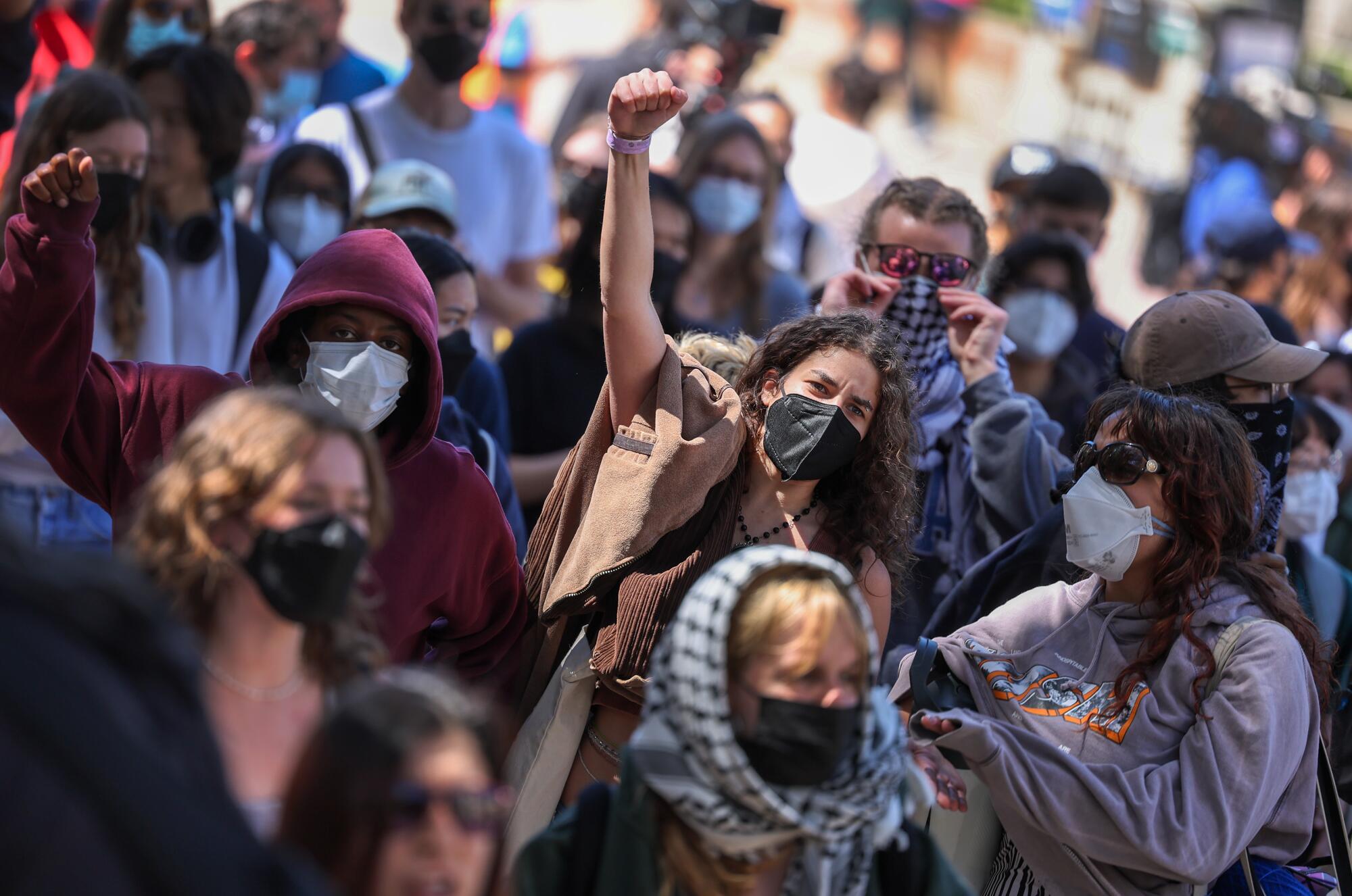
Pro-Palestinian activists demonstrate in UCLA’s Bruin Plaza after arrests were made at the Westwood campus Monday.
(Brian van der Brug / Los Angeles Times)
It’s been a week since police swarmed the UCLA campus and tore down the pro-Palestinian camp, arresting more than 200 people. But the legacy of the encampment remains an issue of much debate, particularly among Jewish students, who make up nearly 8% of the university’s 32,000 undergraduates.
In the days leading up to April 30 — when pro-Israel counterprotesters attacked the camp with fists, bats and chemical spray, and police took hours to stop the violence — frustration had swelled among many Jews: Viral videos showed activists restricting the passage of students they targeted as Zionists.
Some Jewish students said they felt intimidated as protesters scrawled graffiti — “Death 2 Zionism” and “Baby Killers” — on campus buildings and blocked access with wooden pallets, plywood, metal barricades and human walls.
The pro-Palestinian student movement includes various strains of activism, including calls for a cease-fire in Gaza, support for Hamas and demands that universities divest from firms doing business with Israel. But on campuses across the country, no word has become more charged than “Zionist.”
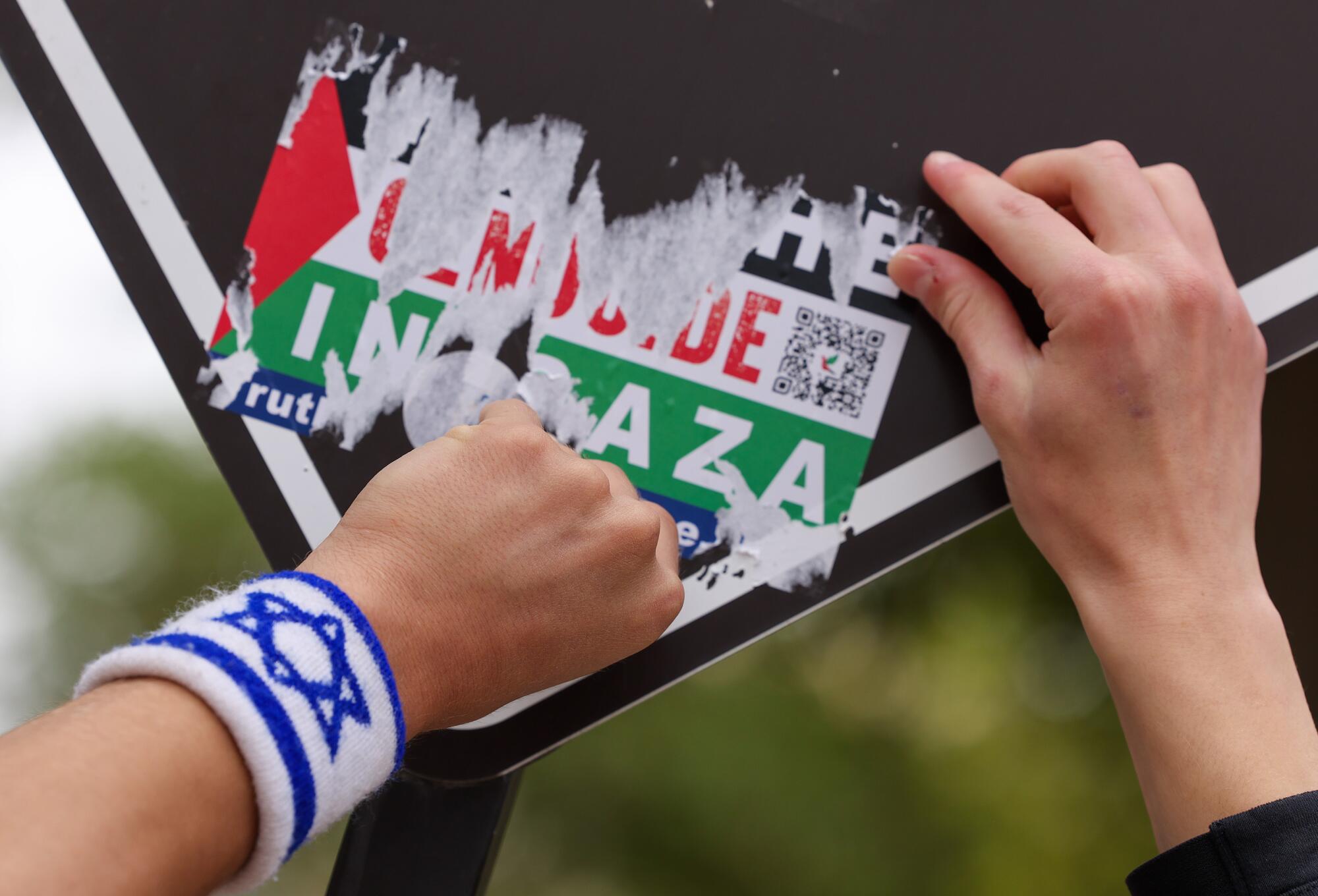
A pro-Israel activist peels a pro-Palestinian sticker off a sign on May 2 as a protest encampment was dispersed.
(Brian van der Brug / Los Angeles Times)
In its most basic definition, a Zionist is somebody who believes that the Jewish people have a right to statehood in their ancestral homeland as a place of refuge from centuries of persecution — in other words, that Israel, established as a Jewish state in the wake of the Holocaust, has a right to exist.
Using that definition, the Anti-Defamation League considers anti-Zionism a form of antisemitism. But protesters — including many Jews — draw a sharp distinction, arguing that it is Zionism that fuels Israel’s right-wing government and the assault on Gaza that they say amounts to genocide against Palestinians.
Some of the Jewish students who took part in the encampment played a role in excluding Zionists.
Members of Jewish Voice for Peace at UCLA, a small but rapidly growing group on campus, argue they had a moral responsibility to pressure university officials to divest from Israel.
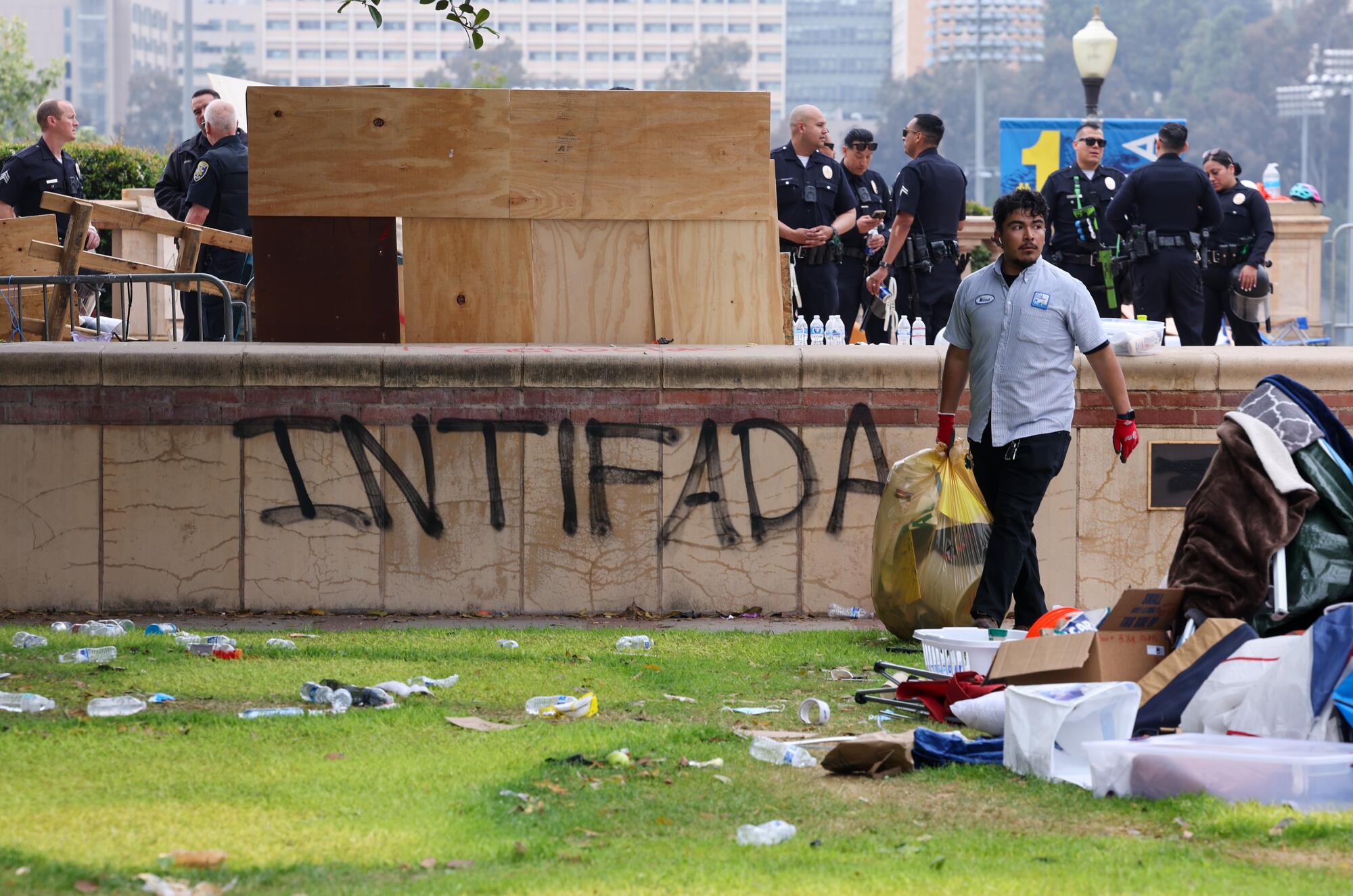
UCLA facilities employees clean up and dismantle the pro-Palestinian encampment on campus May 2.
(Brian van der Brug / Los Angeles Times)
The camp and its checkpoints, they said, were not hostile to Jews. Restricting fellow students from entering was just a pragmatic move to protect protesters inside from physical, verbal or emotional abuse.
“We are committed to keeping each other safe,” said Agnes Lin, 22, a fourth-year art and art history student and member of Jewish Voice for Peace. Anyone who agreed to the UC Divest Coalition’s demands and community guidelines, she said, was welcome.
“What is not welcome is Zionism,” she added. “Or anyone who actively adheres to a very violent, genocidal political ideology that is actively endangering people in Gaza right now.”
In practice, students who supported the existence of Israel were kept out — even if they opposed Israel’s right-wing government and its bombardment of Gaza.
Senior Adam Thaw, 21, said activists blocked him and others from accessing a public walkway to Powell Library.
After telling him they were not letting anyone through, a male activist eyed his Star of David necklace: “If you’re here to espouse that this is antisemitism, then you can leave.”
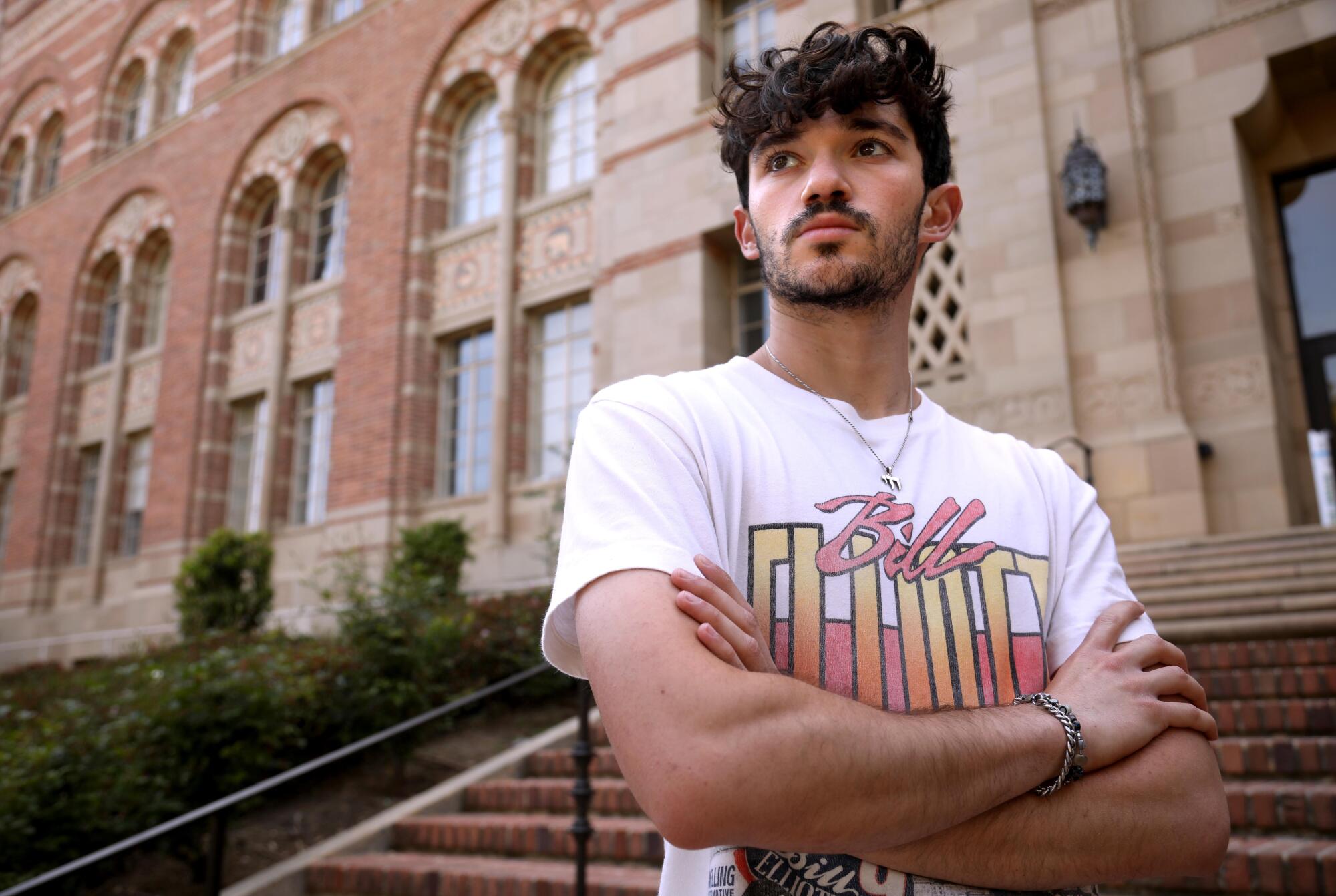
Senior Adam Thaw is on UCLA’s student board of Hillel, the largest Jewish campus organization in the world.
(Genaro Molina / Los Angeles Times)
“Who are you to tell me where I can and cannot go?” said Thaw, who is on UCLA’s student board of Hillel, the largest Jewish campus organization in the world.
As complaints from Jewish students mounted, UCLA declared the encampment “unlawful.” In an April 30 statement, Chancellor Gene Block said most activists had been peaceful, but the tactics of some were “shocking and shameful.”
“Students on their way to class,” he said, “have been physically blocked from accessing parts of the campus.”
::
The campus was dark and hushed when Sabrina Ellis joined dozens of activists at 4 a.m. to set up the encampment on the lawn of Dickson Court.
After pitching tents and erecting barricades of wooden pallets and sheets of plywood, Ellis, a 21-year-old international student from Brazil, took shifts guarding the entrance.
Ellis didn’t call it a checkpoint. The goal was to exclude and physically block “agitators” — anyone who might be violent, record students or disagree with the cause.
“Our top priority isn’t people’s freedom of movement,” Ellis said. “It is keeping people in our encampments physically and emotionally safe.”
The longtime member of Jewish Voice for Peace — who wore a large Star of David over her T-shirt and a kaffiyeh wrapped around her shoulders — said the camp “was not profiling based on religion.”
But as activists blocked Zionist students from public campus space, they faced charges that they engaged in viewpoint discrimination.
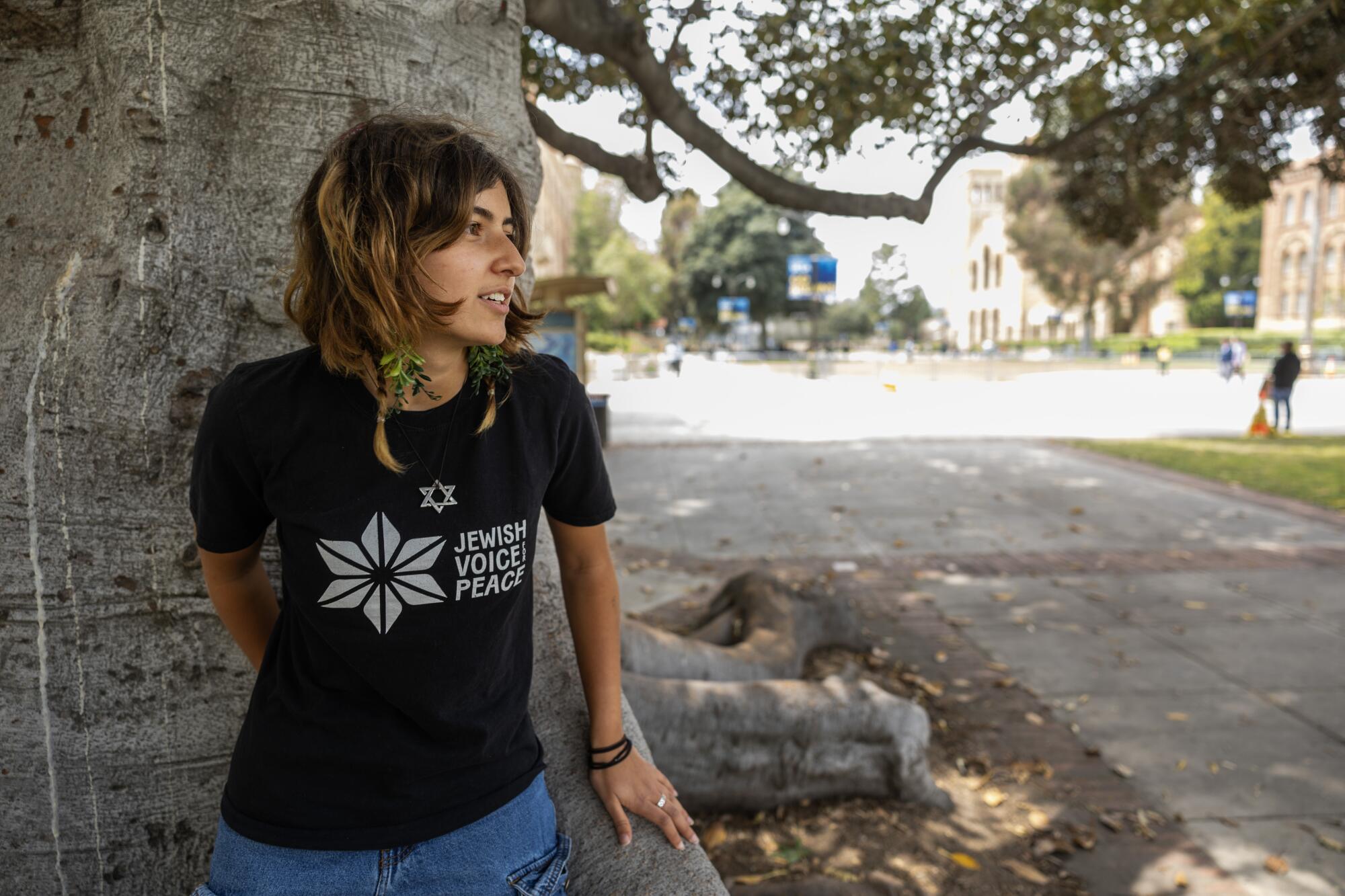
Sabrina Ellis, a junior and a member of Jewish Voice for Peace at UCLA, was part of the pro-Palestinian encampment from the beginning.
(Myung J. Chun / Los Angeles Times)
Before allowing anyone in, Ellis said, a protester read the demands of the encampment, which included calling for UC and UCLA to divest all funds from companies “complicit in the Israeli occupation,” boycott all connections with Israeli universities, sever ties with the Los Angeles Police Department and demand a permanent cease-fire.
Then, activists ran through their safety guidelines: Ask before taking a photo or video; wear a mask to limit the spread of COVID; do not post identifying information or photos; and no engagement with counterprotesters.
If students didn’t agree, “we would just kindly tell them that they’re not allowed to come in,” Ellis said.
Some Jewish students were shaken by the experience, arriving at Hillel upset and even crying.
“They were genuinely going about their day and couldn’t get access as protesters asked them, ‘Are you a Zionist?’ or looked at their necklace,” said Daniel Gold, executive director of Hillel at UCLA.
::
For pro-Palestinian activists who are Jewish, the camp was a peaceful space to promote justice, a welcoming interfaith community with therapist-led processing circles and candlelit prayer services.
Blue tarps and blankets were put down in the middle of the lawn for Islamic prayers and a Passover Seder and a Shabbat service.
On the first evening, about 100 activists, many Jewish, sat in a circle to pray, sing, drink grape juice and eat matzo ball soup, matzo crackers and watermelon.
“It was really beautiful,” said Lin, the art major. “We were trying to hold these spaces to show that Judaism goes beyond Zionism.”
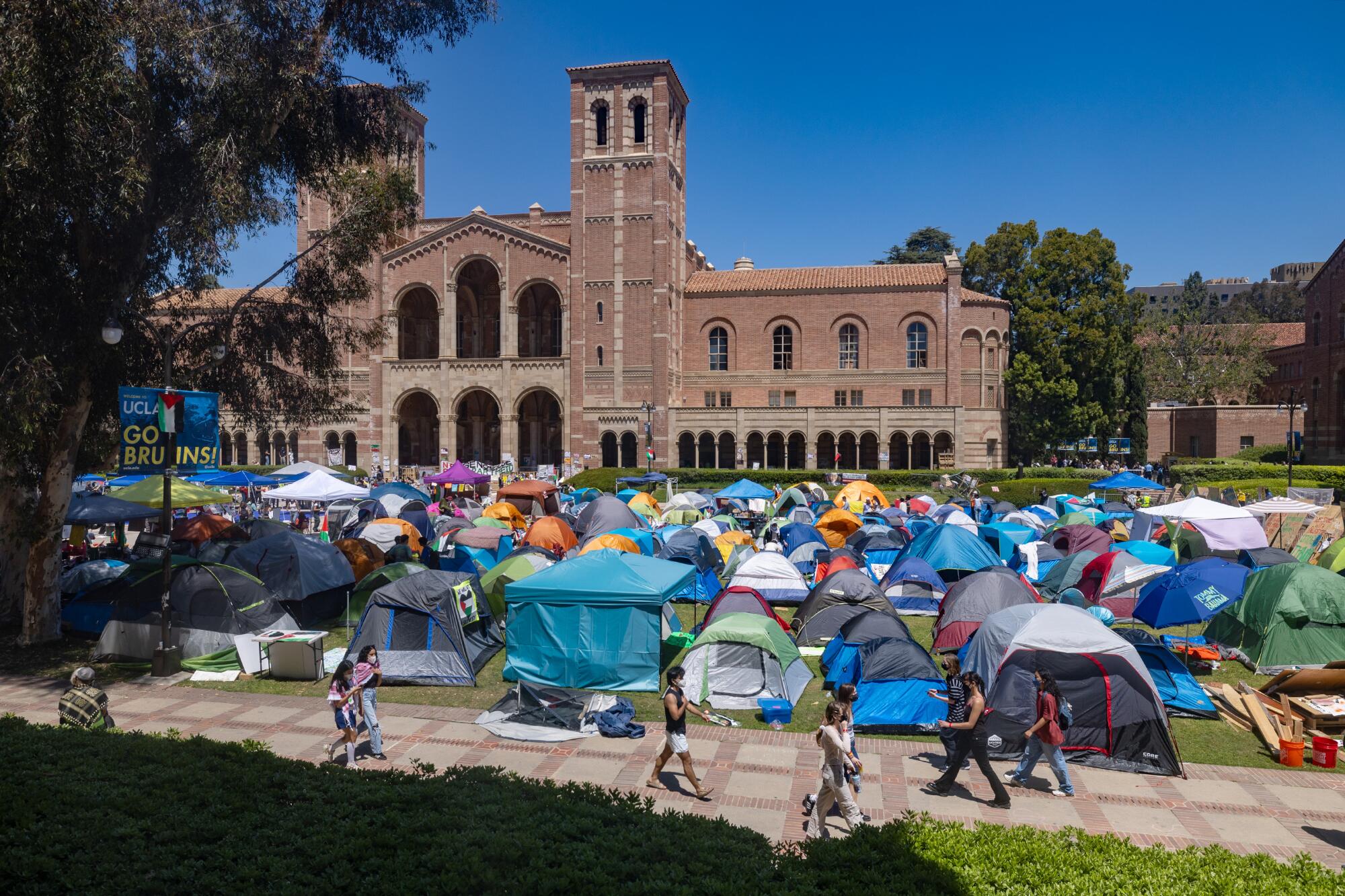
An encampment of pro-Palestinian demonstrators at UCLA’s Dickson Plaza on April 29.
(Brian van der Brug / Los Angeles Times)
Other Jewish students were more wary as they navigated the camp.
Presman, who moved to the U.S. when he was 12 and identifies as a Zionist, was alarmed when he scanned the quad on the first day. He saw signs saying “Israelis are native 2 HELL,” he said, and banners and graffiti showing inverted red triangles, a symbol used in Hamas propaganda videos to indicate a military target.
“Do people know what that means?” he wondered.
Tucking his Star of David under his T-shirt, Presman said, he entered and approached activists, introducing himself as an Israeli citizen.
“Maybe we can find common ground,” he said, asking, “one human being to the other?”
Some students put their hands up, he said, blocking him as they walked away. Others treated the conversation as a joke. One protester, he said, told him that everything Hamas did was justified.
Presman said he had one good conversation: An activist who identified as anti-Zionist admitted not being 100% educated on what Zionism was, but agreed that Israel should exist. They came to the conclusion the activist was a Zionist.
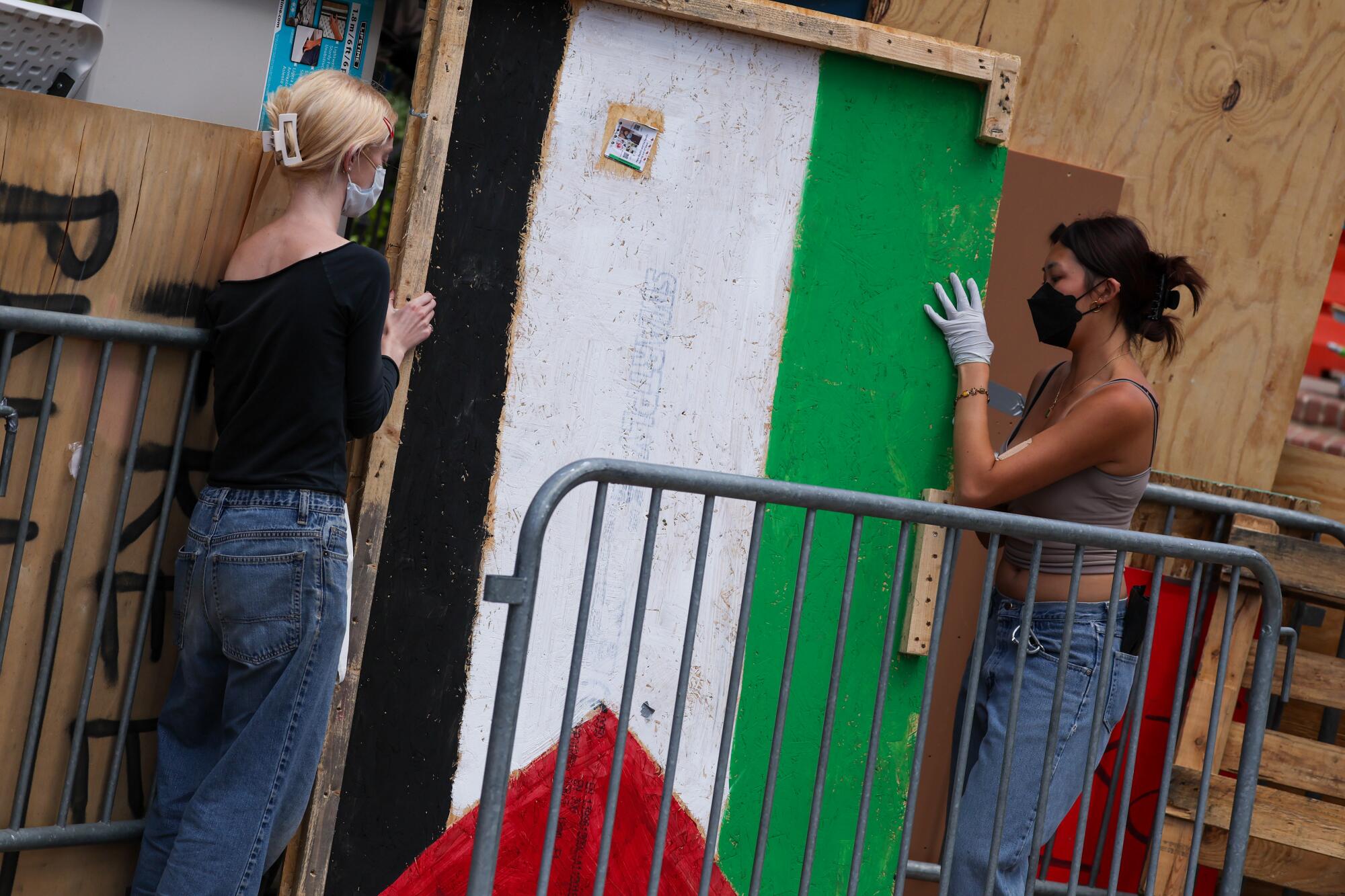
Pro-Palestinian encampment participants reinforce the camp barriers at UCLA on May 1.
(Brian van der Brug / Los Angeles Times)
But most of Presman’s exchanges, he said, ended negatively when activists realized he was defending Zionism. He said he was called a “dirty Jew” and “white colonizer.”
Other students — even those who did not fully support the encampment — said they did not experience such slurs.
Rachel Burnett, a senior who described herself as a non-Zionist Jew, disagreed with the call for divestment and academic boycotts, especially of UCLA’s Nazarian Center, an educational center for the study of Israeli history, politics and culture.
Entering the camp after a classmate vouched for her, Burnett was disturbed by anti-Israeli signs and graffiti that named Abu Ubaida, the spokesperson for the military wing of Hamas. But she also bonded with protesters, including a woman in a hijab.
“Of course, some protesters deny Oct. 7 or condone violence as long as it can be put under the guise of decolonial resistance, which is obviously horrific,” Burnett said. “But that’s not the case of many students inside the encampment.”
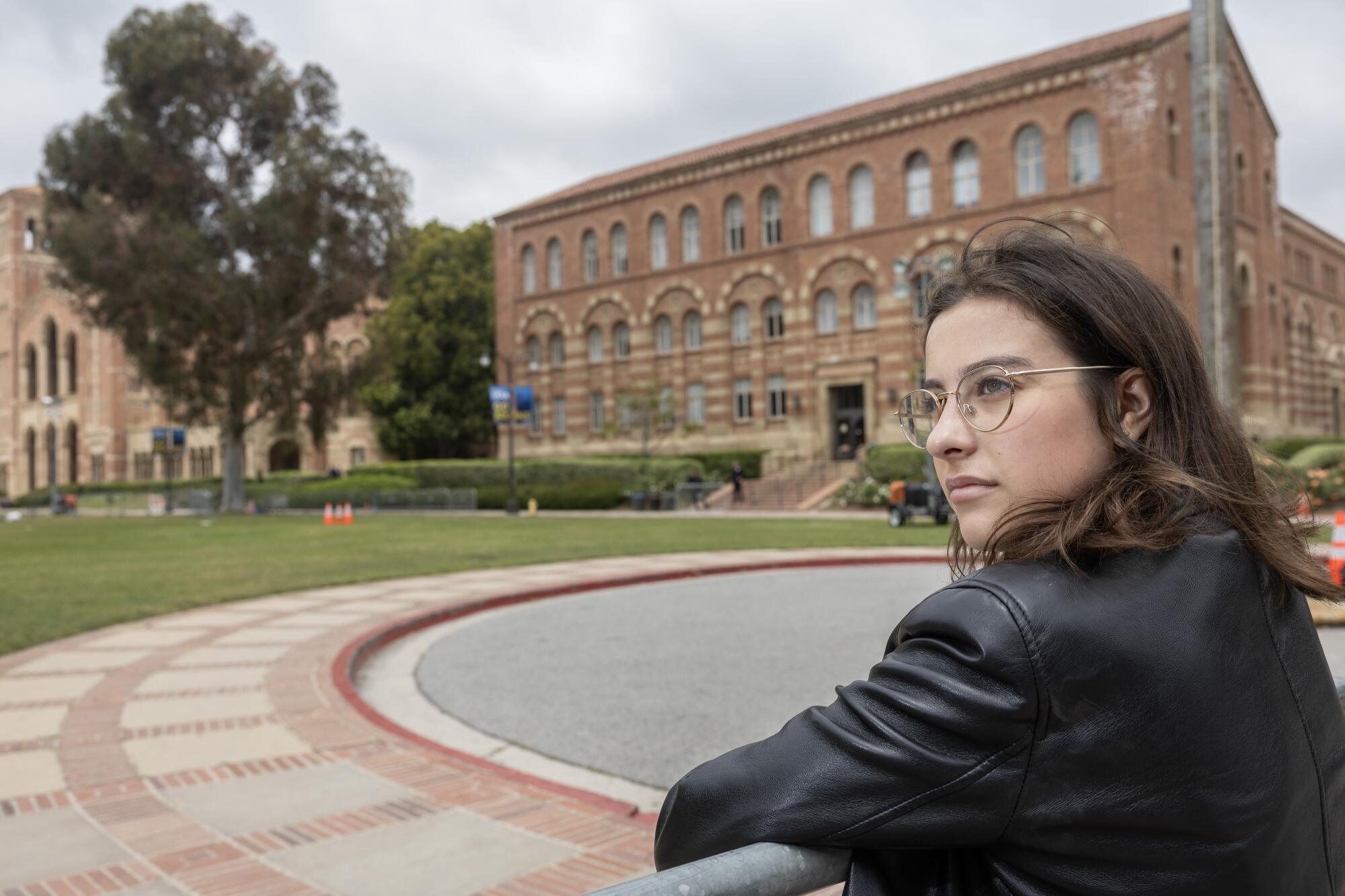
Rachel Burnett, a senior who described herself as a non-Zionist Jew, disagreed with the call for divestment and academic boycotts, especially of UCLA’s Nazarian Center, an educational center for the study of Israeli history, politics and culture.
(Myung J. Chun / Los Angeles Times)
Burnett contrasted what she saw as a peaceful, friendly mood inside the camp with the pro-Israel counterprotests where people held up benign slogans, such as “Bring the Hostages Home,” but engaged in hostile behavior.
As counterprotesters converged for a Sunday rally, she said, a pro-Israel activist spat on her and told she should have been slaughtered in the kibbutzim on Oct. 7.
Just as some pro-Palestinian activists demonized all Zionists as evil and pro-genocide — ignoring the wide range of viewpoints within the Zionist community — Burnett thought some pro-Israel counterprotesters were dehumanizing student activists in the encampment and spreading a “mass hysteria narrative.”
As the encampment expanded — and organizers set up entrance points near Royce Hall and Powell Library — some Jewish students took videos that swiftly went viral.
“It’s time to go,” a protester wearing a yellow safety vest and kaffiyeh told a student in one video as he guarded an entrance near Powell Library. “You don’t have a wristband.”
A standoff ensued.
“Are you a Zionist?” the protester asked.
“Of course I’m Zionist,” the student replied.
“Yeah, we don’t let Zionists inside.”
-

 African History4 months ago
African History4 months agoBlack History Facts I had to Learn on My Own pt.6 📜
-

 African History4 years ago
African History4 years agoA Closer Look: Afro-Mexicans 🇲🇽
-

 African History1 year ago
African History1 year agoPROOF AFRICAN AMERICANS AIN'T FROM AFRICA DOCUMENTED EVIDENCE
-

 African History2 years ago
African History2 years agoHow Did Normal Medieval People Survive Winter? | Tudor Monastery Farm | Chronicle
-

 African History3 years ago
African History3 years agoThe Entire History of Africa in Under 10 Minutes – Documentary
-

 African History3 years ago
African History3 years agoWhat happened to the many African Kingdoms? History of Africa 1500-1800 Documentary 1/6
-

 African History2 years ago
African History2 years agoAFRO MEXICO: Black History In Mexico!
-

 African History1 year ago
African History1 year agoA Black African King in Medieval European Art







